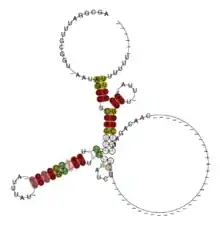Gammaproteobacteria rimP leader
The γ-proteobacterial rimP leader is a putative attenuator element identified by bioinformatics within bacteria of the γ-proteobacterial phylum. It is located upstream of the rimP-nusA-infB operon encoding RimP, a protein shown to be involved in the 30S ribosomal subunit maturation,[2] NusA, a transcriptional factor controlling termination, and the translation initiation factor IF-2 respectively. The rimP-leader presents a Rho-independent terminator at the 3' end, corresponding to a highly conserved GGGc(...)gCCC motif. This motif is presumed to operate as a non-coding leader. Its mechanism remains unknown, but it is tempting to speculate a regulatory involvement of the NusA protein, which expression has been shown to lower the operon expression,[3][4] and which is already involved in the attenuation of the Trp, His and S10 operons.[5]
| Gammaproteobacteria rimP leader | |
|---|---|
 Conserved secondary structure of rimP leader, showing the fraction of canonical base pairs | |
| Identifiers | |
| Symbol | rimP |
| Rfam | RF01770 |
| Other data | |
| RNA type | Cis-reg; leader |
| Domain(s) | Gammaproteobacteria |
| PDB structures | PDBe |
References
- Nord S, Bylund GO, Lövgren JM, Wikström PM (2009). "The RimP protein is important for maturation of the 30S ribosomal subunit". J Mol Biol. 386 (3): 742–753. doi:10.1016/j.jmb.2008.12.076. PMID 19150615.
- Plumbridge JA, Dondon J, Nakamura Y, Grunberg-Manago M (1985). "Effect of NusA protein on expression of the nusA,infB operon in E. coli". Nucleic Acids Res. 13 (9): 3371–3388. doi:10.1093/nar/13.9.3371. PMC 341241. PMID 2987884.
- Nakamura Y, Plumbridge J, Dondon J, Grunberg-Manago M (1985). "Evidence for autoregulation of the nusA-infB operon of Escherichia coli". Gene. 36 (1–2): 189–193. doi:10.1016/0378-1119(85)90085-X. PMID 2998933.
- Worbs M, Bourenkov GP, Bartunik HD, Huber R, Wahl MC (2001). "An extended RNA binding surface through arrayed S1 and KH domains in transcription factor NusA". Mol Cell. 7 (6): 1177–1189. doi:10.1016/S1097-2765(01)00262-3. PMID 11430821.